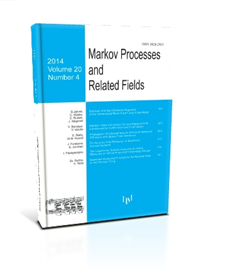On a Two-Temperature Problem for Wave Equation
T.V. Dudnikova, A.I. Komech, H. Spohn
2002, v.8, Issue 1, 43-80
ABSTRACT
Consider the wave equation with constant or variable coefficients in $R^3$. The initial datum is a random function with a finite mean density of energy that also satisfies a Rosenblatt- or Ibragimov - Linnik-type mixing condition. The random function converges to different space-homogeneous processes as $x_3\to\pm\infty$, with the distributions $\mu_\pm$. We study the distribution $\mu_t$ of the random solution at a time $t\in R$. The main result is the convergence of $\mu_t$ to a Gaussian translation-invariant measure as $t\to\infty$ that means central limit theorem for the wave equation. The proof is based on the Bernstein `room-corridor' argument. The application to the case of the Gibbs measures $\mu_\pm=g_\pm$ with two different temperatures $T_{\pm}$ is given. Limiting mean energy current density formally is $-\infty\cdot (0,0,T_+ - T_-)$ for the Gibbs measures, and it is finite and equals $-C(0,0,T_+ - T_-)$ with $C>0$ for the convolution with a nontrivial test function.
Keywords: wave equation,random function,Gaussian measure,correlation function,characteristic functional,Radon transformation
COMMENTS
Please log in or register to leave a comment

